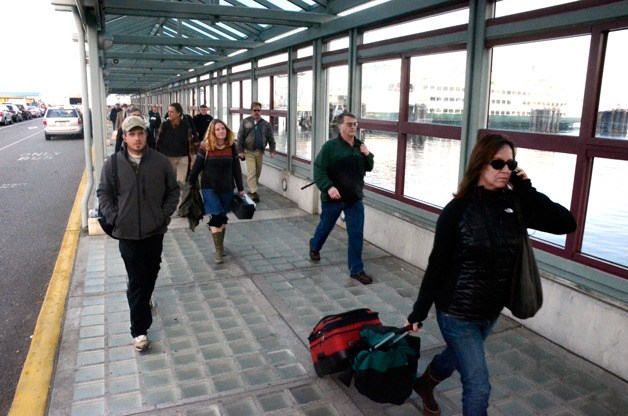The Port of South Whidbey has tentatively agreed to join Langley in pursuit of a state grant that, if awarded, would require the port to issue more than $644,000 in revenue bonds to fund a parking garage in Mukilteo.
The port commissioners voted unanimously at the board’s regular meeting Tuesday to move forward with the partnership, but with the provision that the junior taxing district could do so without obligation.
Langley Mayor Larry Kwarsick, the primary author of the partnership, attended the meeting and expressed his gratitude to the board.
“I want to thank you,” said Kwarsick, shaking hands with each of the commissioners following the vote.
The economy has severely affected the ability of governments to accomplish major projects and one of the solutions is to band together to work collectively toward a common goal, the mayor said.
Last week, and unbeknownst to the port commissioners, Kwarsick asked the Langley City Council to team up with the port to apply for funding from the state Department of Transportation through its Regional Mobility Grant Program.
The money would be used to buy land and then build a parking garage in Mukilteo – a facility that would be owned by the port – and also fund a Sunday bus service pilot program, which would be run by the city.
The idea is to bolster pedestrian use of the ferry by increasing the options for commuters and visitors alike. It’s believed the parking garage would make off-island jobs more feasible for residents and allow greater flexibility for tourists.
The Sunday bus service is expected to complement the new garage by providing service to and from Langley and the ferry dock.
City, port must match
The city council agreed to the partnership, though at the time the amount being sought – $2.6 million – and matches for both municipalities had not yet been determined. Like the port, Langley has a 20 percent match of its own, being required to contribute $14,560 from the general fund for purchase and operation of 15-passenger shuttle bus.
Port Commissioner Curt Gordon, president of the board, had discussed the merits of such a plan with Kwarsick in the past, but no formal partnership had been formally proposed to the rest of the board at the time.
Port and city officials worked together to hammer out many of the details in time for the Tuesday meeting, which was the day before the grant application deadline, but there were still a lot of questions by port commissioners.
For one, a past investigation by a former port attorney determined that there may be legal issues regarding a port owning and operating a parking garage outside of its district boundaries.
Commissioner Chris Jerome said the idea behind the plan sounds great but it still has to be within the bounds of state law.
“I don’t want us to sign up for something that’s illegal,” Jerome said.
He also questioned the finances behind the plan. Based on early calculations, the 65-car structure would pull in about $171,000 a year to start — $76,000 net — beginning in year four. By year 20, that would increase to $295,300.
That includes additional revenue from two retail spaces on the bottom, which are required to be included under Mukilteo city code, said Angi Mozer, finance manger for the port.
However, Jerome worried whether the numbers of the prospective Mukilteo lot were realistic. The port’s existing parking lot above the Clinton ferry dock has 200 spaces and is expected to pull in just $43,000 this year.
“What happens if the proceeds from this parking lot don’t pay for these revenue bonds?” Jerome said.
“Can you assure us we won’t go broke trying to do this?” he said.
Commissioner Dennis Gregoire also voiced interest in the proposal, calling the concept “intriguing.” But he had a “whale raft” of questions, ranging from the need for more information about current travel patterns to the timeline.
“You’ll be running the bus for two years by the time we have this thing built,” Gregoire said.
Addressing the legal questions, Mozer said it appears to be something of a gray area. The port’s current attorney has reviewed the issue and believes the enterprise would be legal with a few provisions, she said.
Namely, having a parking facility outside its boundaries would require some type of agreement with another port. It doesn’t have to be the same one where the structure is, in this case the Port of Everett, but their consent would be required.
Gordon voiced several concerns of his own. He said the port was “obviously not prepared” to make any firm commitments with so many unanswered questions and wanted assurances from Kwarsick that the board could move forward without firm obligation.
Gordon was, however, the largest proponent for the partnership. With the legal arguments largely settled, he said there were no ethical or logical reasons not to proceed. He also pointed out that the port has few assets that bring in revenue and this could, in time, be a money maker as well as an economic driver.
“To me, the biggest problem with this is the high-speed Larry Kwarsick timeline,” he joked.
Following the vote, he agreed with Kwarsick on the merits of a team approach to large projects. The details can sometimes be a little trickier to sort out but the benefit in the end is worth it.
“We owe it to our constituents to be partners,” he said.
Kwarsick said grant awards won’t be decided until next year, but an initial fleshing of applications will occur soon. Langley and the port should know by December whether they are in the running, he said.



